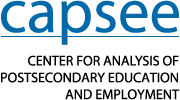Nonpecuniary Returns to Postsecondary Education: Examining Early Non-Wage Labor Market Outcomes Among College-Goers in the United States
By: Lauren Schudde | January 2017
While research consistently finds positive earnings returns to educational attainment, there is little evidence on postsecondary education’s impact on other employment-related outcomes. Yet nonpecuniary returns to schooling are particularly important in the United States, where fringe benefits are typically tied to employment and there is a great degree of variation in job quality. Using longitudinal data following a nationally representative sample of young persons who enrolled in at least some college education, this paper examines nonpecuniary labor market outcomes associated with different levels of postsecondary educational attainment. Overall, the results indicate that increasing levels of postsecondary educational attainment positively predict a number of beneficial employment outcomes. This is particularly the case for fringe benefits. After controlling for participants’ backgrounds and educational experiences, attainment positively predicts access to employer-provided health and dental insurance, retirement, and paid leave. Results concerning job satisfaction and flexibility are weaker and more complex.
A version of this paper written by Lauren Schudde and Kaitlin Bernell and titled, “Educational Attainment and Nonwage Labor Market Returns in the United States” appears in AERA Open.
